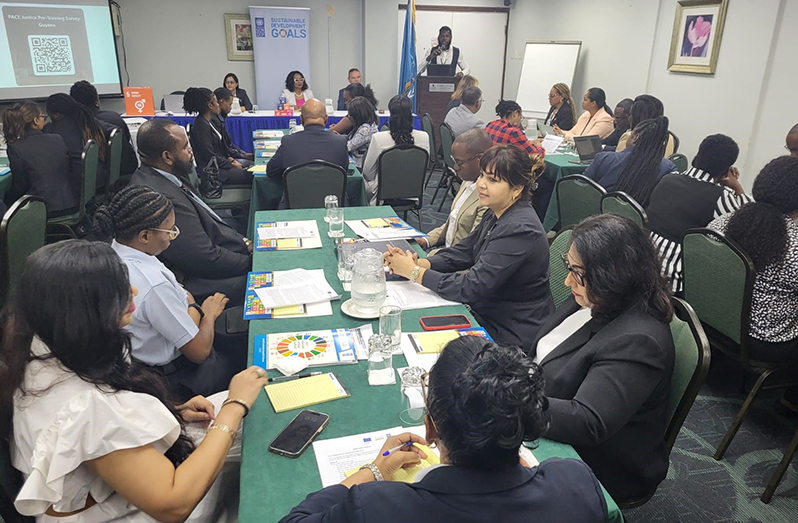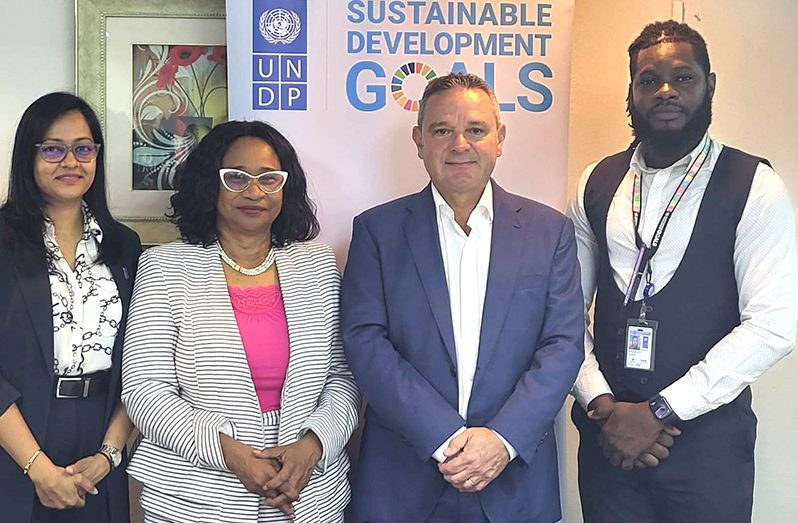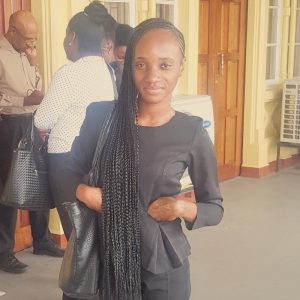— at opening of PACE Justice regional training
CHANCELLOR of the Judiciary (ag), Justice Yonette Cummings-Edwards, has made a strong call for the use of restorative justice and mediation in dealing with minor criminal offences, emphasising that incarceration is not always the answer.
Her remarks came on Saturday at the opening ceremony of the Partnership of the Caribbean and the European Union on Justice (PACE Justice) Regional Programme’s training workshop on Restorative Justice, Criminal Mediation and Children in Conflict with the Law.
The PACE Justice Project is a collaboration between the UNDP and the Ministry of Legal Affairs. The regional initiative, hosted in Cara Lodge in Georgetown, brought together judges, magistrates and prosecutors from Guyana, as well as representatives from the European Union (EU), and the United Nations Development Programme (UNDP).
“There’s no sense sending everyone to prison for every single minor offence that might have been committed. Some of these [offences] could be dealt with effectively through processes such as restorative justice and criminal mediation, which will assist in restoring them to better persons in society, repairing the harm, as well as having a safer society in the long run,” Chancellor Cummings-Edwards stated.
She emphasised the need for Guyana to transition to a justice system grounded in restoration, rehabilitation, and reconciliation, particularly in cases involving children. In support of this shift, she noted that Guyana was taking the lead in championing restorative justice, as demonstrated by the promulgation of the Restorative Justice Act and the establishment of a Restorative Justice Centre in Georgetown.
She pointed out that Guyana’s Juvenile Justice Act reflects key principles of restorative justice, as it offers a variety of sentencing options for juveniles found guilty of an offence. These, she added, include compensation for loss, damage, or injury resulting from the offence, restitution of property, and even community service.

Justice Cummings-Edwards highlighted that Guyana is fortunate to have a Children’s Court in nearly every magisterial district, along with judicial officers who are specifically trained to handle cases involving children in conflict with the law.
The head of the judiciary noted that criminal mediation is also viewed as a valuable tool in the justice system. While it is not widely practised on a large scale in Guyana, she explained that magistrates often encounter situations in their daily handling of cases where they must decide whether to proceed with formal court action.
She explained that, in many cases, magistrates have the opportunity to facilitate dialogue between the accused and the victim—or virtual complainant—in an effort to reach a mutually acceptable resolution. She also highlighted that over 90 percent of criminal cases in Guyana originate in the magistrates’ courts, underscoring the importance of integrating restorative approaches at that level.
The Chancellor noted that traditional punitive systems often fail to address the root causes of crime and, instead, contribute to overburdened prison systems and recidivism.
However, she acknowledged that certain offenders may require a “short shock treatment” approach, including a period of imprisonment, to address the severity of their actions and deter future misconduct.
Justice Cummings-Edwards concluded her address with a call to action for the judiciary and justice stakeholders. “It is important for us, as magistrates and judges, to be familiar with current trends, reforms, and practices across the region,” she stressed.
“So that we can up our game and even be better as we dispense justice in our courts. We play a critical role in promoting justice—not only within the criminal justice system, but indeed the entire justice system.”
Her sentiments were echoed by other speakers during the ceremony, including Spiro Polycandriotis van Duynhoven, Head of Political Section, EU Delegation to Guyana, for Suriname,
Aruba, Bonaire, Curaçao, Saba, St Barts, St Eustatius and Sint Maarten.
He said the PACE Justice Project, launched in 2023, is a €10 million EU-funded initiative to reform criminal justice in nine Caribbean countries, including Guyana.
According to him, the three-day training aims to expand the use of these methods, particularly for juvenile justice, aligning with Guyana’s 2009 Child Protection Act.
“The primary objective is to assist local partners in reducing criminal case backlogs for innovative approaches, including restorative justice and criminal mediation. Restorative justice was incorporated into the pace justice work plan at the request of beneficiaries, particularly the Eastern Caribbean Supreme Court, following discussion during the project’s launch in October 2023,” the official explained.
Emphasising the significance of restorative justice, van Duynhoven noted: “One of the most impactful applications of restorative justice is in addressing minor offences. Traditional court systems often expend considerable resources on nonviolent minor cases, which contribute to major delays and inefficiencies. By incorporating criminal mediation as an alternative, we can alleviate pressure on the courts, allowing them to focus on more serious crimes.”
He stated that both criminal mediation and restorative justice play a vital role in creating a child-friendly justice system where young people feel safe, heard and supported throughout legal proceedings.
In closing, van Duynhoven praised the collaborative spirit of the initiative. “Let us work together towards a future where justice is not just an ideal, but a reality for all.”
Nadira Balram, Programme Analyst, Peace and Governance, UNDP Guyana, explained that the PACE Justice Project provides specialised equipment and software to improve efficiency and offers targeted training on criminal mediation, restorative justice, and children in conflict with the law.
She stated that the UNDP’s support also reaches the Office of the Director of Public Prosecutions (DPP), where an e-filing system was recently implemented.



.jpg)










